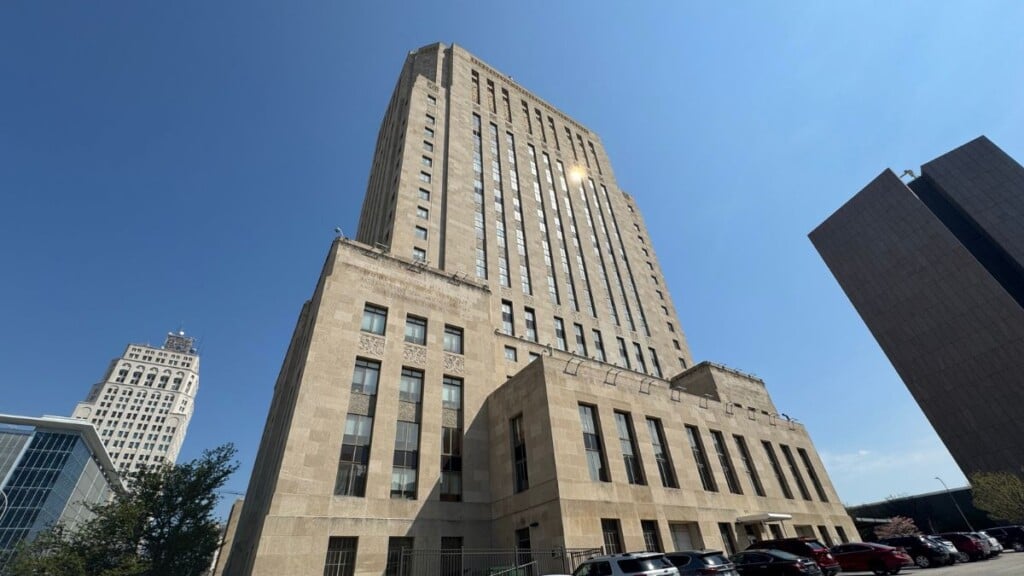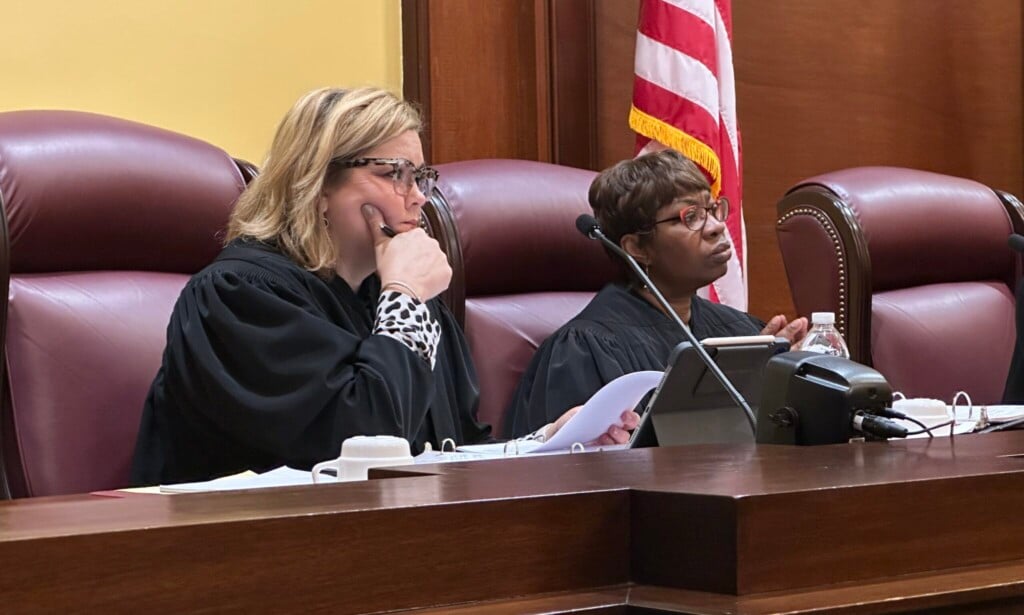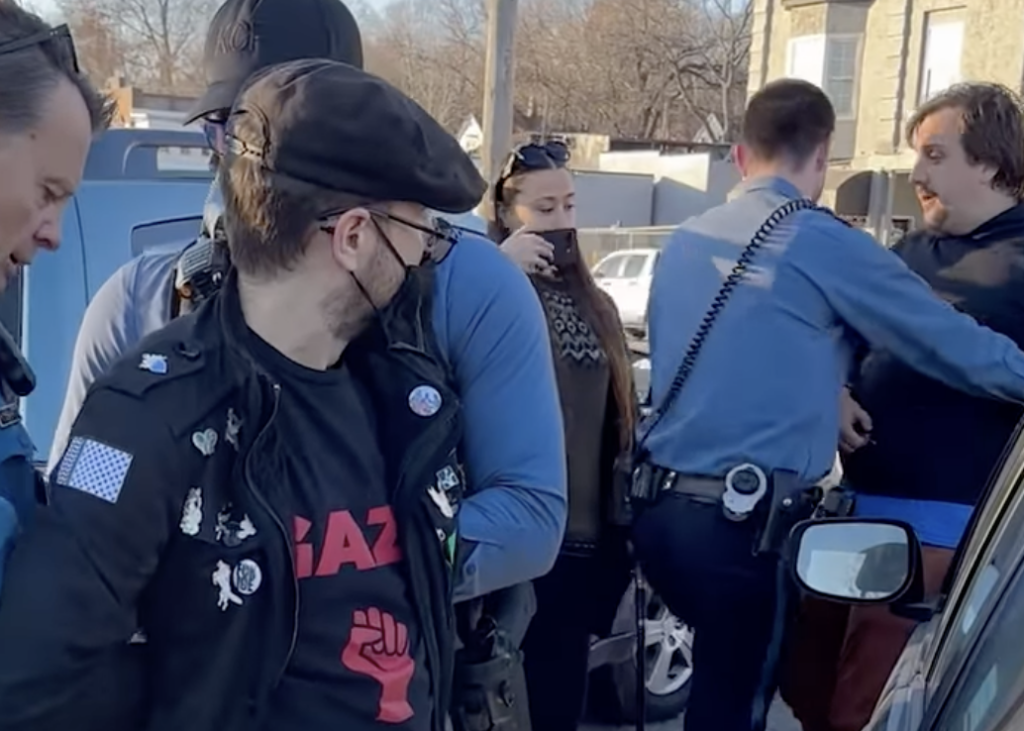Threat of federal funding freeze panics KC’s nonprofit health care community
Community health clinics and other nonprofits that rely on tax dollars to provide health care and other services are scrambling. They believe funding cuts are inevitable.

President Trump’s federal funding freeze threat caused worry for nonprofit health care organizations. (Suzanne King/The Beacon)
For Wil Franklin, chief executive of KC CARE Health Clinic, Tuesday began with a blizzard of texts and emails.
A sweeping plan to freeze federal grants and loans affected $5 million that his community safety-net clinic relies on. The online portal that community health clinics across the country use to access federal money was suddenly inaccessible.
Franklin said his clinic had cash reserves to make it a couple of months without the federal dollars, but he was hearing from colleagues at other community health centers — known as federally qualified health clinics or FQHCs — who were trying to secure bridge loans just to cover payroll.
“It is very frightening for the health care workforce in FQHCs,” Franklin said.
A day of meetings and phone calls about how the clinic could survive without federal grant funding finally ended when U.S. District Judge Loren L. AliKhan issued a stay, temporarily pausing President Donald Trump’s funding freeze.
Late Tuesday, Franklin got an email letting him know that access to the online funding portal had been restored. And nearly 24 hours later, the White House announced that it was rescinding the memo, causing more uncertainty.
Was the crisis averted?
“Ask me in two hours,” he said. “Ask me Friday.”
Federal funding is a crucial contributor to the regional economy.
In 2021, Missouri state and local governments got $18.4 billion from the federal government, making up about 18% of revenue. Kansas got $8.1 billion, or about 17% of revenue. That funding is the equivalent of 5% of the economic activity in the two states.
In a statement, the Economic Policy Institute warned that freezing federal funding “risks throwing the U.S. economy into chaos.”
The statement, written by Samantha Sanders and Josh Bivens, warned that risks increased the longer uncertainty over federal funding persisted.
“The federal government gives $1 trillion in grants to state and local governments alone, for everything from physical infrastructure and public safety to health and social services,” they wrote. “Removing this money from the economy would represent a huge economic shock.”
The freeze was intended to get all federal funding in line with Trump’s various executive actions on gutting diversity programs and so-called “woke gender ideology.”
That memo ordering a federal funding freeze has been reversed, but the executive orders remain in place — calling into question whether any grants are safe.
Philip Rocco, a professor of political science at Marquette University, said part of the problem is that the memo’s language was so vague.
“Is the heating assistance program going to be reviewed for wokeness or quote-unquote Marxist equity? What would that look like?” he said. “The memo is nothing short of theater of the absurd.”
In health care, uncertainty remains
In the nonprofit health care industry, which cares for some of society’s most vulnerable people and relies on federal funding for a bulk of its revenue, panic and uncertainty haven’t gone away.
If it wasn’t already clear that critical health care services could be targeted by Trump, all doubt was removed after Tuesday’s announced pause to federal grants. Nonprofits that rely on government funding to provide safety-net services were scrambling to make plans for inevitable future cuts.
“The biggest impact so far is panic and stress about losing access to critical funds,” said Anna de Paula Hanika, the founder and CEO of Uno Health, a startup that offers technology to help low-income people sign up for government safety-net services.
In an emailed response to questions, Hanika predicted that, beyond the proposed funding freeze, actual funding cuts are likely, probably starting with Medicaid, the low-income health insurance program, and the Supplemental Nutrition Assistance Program, also known as SNAP or food stamps.
A Jan. 27 memo from Matthew J. Vaeth, acting director of the Office of Management and Budget, said the Trump administration’s funding freeze would ensure that tax spending aligns with “administration priorities.” To be sure those priorities are followed, the memo said, a “senior political appointee” should get oversight of every “federal financial assistance program.”
“What that means,” said Patrick Sallee, president and CEO of Vibrant Health, a community health center in Wyandotte County, “is they’re going to have a political appointee decide if any of these grants continue and which get cut.”
Any grants seen as involving diversity, equity and inclusion (DEI), or gender-affirming care, for example, are probably at risk, Sallee said.
“They want to do an evaluation and cut things,” Sallee said.
It was unclear how much the administration understood about just how far-reaching its funding freeze would have been.
For a few hours on Tuesday, published reports said Medicaid systems were down across the country. That added to a widespread sense in the nonprofit health sector that federal support, long seen as the most reliable funding available, is now far from certain.
A follow-up memo from the Trump administration clarified that direct aid programs, such as Medicaid and food stamps, would not be affected. All along the administration maintained that it didn’t intend to freeze Social Security payments or Medicare, health care for seniors.
The Missouri Department of Social Services, which administers MO HealthNet, Missouri’s version of Medicaid, reiterated in a message to employees and stakeholders that the pause in federal funds would have excluded programs providing “direct benefits to Americans,” including Medicaid and SNAP.
“At this time,” the message said, “the department will maintain its regular business operations and work closely with the Office of Administration and federal partners to assess any future implications.”
In 2023, Medicaid and CHIP (the Children’s Health Insurance Program) funneled almost $634 billion to state and local governments. Almost $17 billion went to public health.
Safety net needs to exist
Emily Hage, president and CEO of FirstCall, a Kansas City nonprofit that provides substance abuse treatment and prevention education, said even a two-month pause in federal funding could “have a serious impact on our ability to meet our mission.”
The nonprofit health sector has always and will always need taxpayer support to provide the essential services it offers, Hage said.
“It’s a social safety net that needs to exist,” she said. “But you can’t get rich doing it.”
Community health clinics are a good example. There are 1,300, like Vibrant and KC Care, around the country. In 2023, they provided primary care, dental, vision and other health services to 31 million patients, according to a KFF report.
Patients of these safety-net clinics are disproportionately low-income, with 90% having incomes at or below twice the federal poverty level. The clinics treat uninsured patients as well as patients who receive Medicaid or private insurance. But the bulk of community health clinic funding — 44% — comes from Medicaid. Another 11% comes from federal grants, like the ones threatened by the funding freeze.
Franklin, of KC CARE, said he wants politicians to understand that the patients his clinic serves don’t fit the stereotypes that exist about uninsured people not working hard enough or being lazy.
“They’re people who work not one, but two or three part-time jobs,” Franklin said. “They’re people who work in the restaurant industry. The hospitality industry. They’re artists. They're small-business owners. They are really the lifeblood of the community in many ways. “
But without KC CARE or another federally funded community health clinic, they won’t have access to affordable health care, he said.
“Health centers have historically enjoyed bipartisan support,” Franklin said. “There’s never really been a political divide.”
Freezing funding they rely on, he said, would have a major economic impact.
“I sometimes wonder if they’re recognizing the downstream implications,” Franklin said.
While Sallee said that Vibrant Health has other sources of funding to help it through, many nonprofits would face major disruptions, and many would not survive a gap in their federal funding.
“This isn’t an environment where everybody just pulls on their endowment or their operating reserve to fund it for a little while, while the federal government figures it out,” he said. “That’s not how these programs run.”
Jaynell Assmann, a nurse practitioner and founder of Care Beyond the Boulevard, a nonprofit that provides health care to homeless people in Kansas City, said her organization relies on some federal funding. But she had no idea this week how much of it would have been in the crosshairs of the proposed federal freeze.
“We’re going to keep doing the work,” she said, “and try to find out where funding is and if we’re safe. There’s nothing else we can do.”
This article first appeared on Beacon: Kansas City and is republished here under a Creative Commons license.![]()




